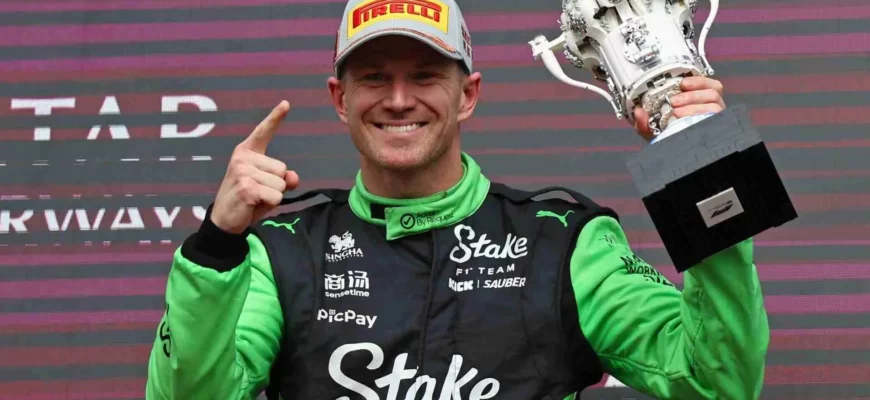SILVERSTONE, England – In the demanding world of Formula 1, where milliseconds dictate destiny and careers are often fleeting, some records are chased with fervor, while others are burdens carried for years. For German driver Nico Hülkenberg, the latter category contained perhaps the most persistent and ironic statistic of his career: the most race starts without ever standing on the podium.
That particular narrative, a source of endless discussion and mild exasperation, finally came to a dramatic halt on Sunday at the British Grand Prix. After an astonishing 239 attempts spanning 15 seasons, Hülkenberg crossed the finish line in a podium position, achieving a milestone that had, for so long, appeared stubbornly out of reach.
The setting for this long-awaited triumph added another layer of improbability. Hülkenberg’s achievement came driving for Sauber, a team undergoing a significant transition towards becoming Audi in 2026. Only last season, the Swiss outfit finished last in the Constructors` Championship, failing to score a single point. A podium finish at Silverstone was, by any reasonable measure of form, a highly improbable outcome. Yet, through a combination of strategic execution, driver skill, and perhaps a dash of that unpredictable racing magic, Sauber and Hülkenberg seized the moment.
It is almost baffling in its duration. Hülkenberg’s Formula 1 journey began in 2010. In his rookie season, he sensationally claimed a pole position at the Brazilian Grand Prix, signalling the immense talent that had seen him dominate junior categories, often besting rivals like a young Sebastian Vettel. He was, undeniably, one of the sport’s bright prospects.
Yet, while others around him – including many he had outperformed on the way up – climbed the podium steps, Hülkenberg remained conspicuously absent. This drought was not for lack of talent, a point readily acknowledged by peers and team principals alike. Two-time world champion Fernando Alonso noted Hülkenberg as one of the grid`s best drivers who simply “never had the opportunity to have a proper car.” Former teammate Carlos Sainz was more direct: “For me, he’s always been a top-five driver… I’m glad he has this podium to shut everyone up. I never doubted him.” Even reigning champion Max Verstappen offered visible congratulations as they passed on the cooldown lap.
The paradox was further highlighted by his success outside F1. In 2015, on his very first attempt, Hülkenberg won the prestigious 24 Hours of Le Mans, a monumental achievement by any standard. He had proven his capability at the highest levels of motorsport; the F1 podium remained the curious, glaring omission on his resume.
There were near misses, of course. Moments where luck, circumstance, or contact intervened. A collision while leading in Brazil in 2012. A strategically unfortunate pit stop in Monaco in 2016. A costly spin in the wet at his home race in Germany in 2019. These instances only served to deepen the enigma and fuel the persistent question from the media: Did the record weigh on him?
His reaction to this query evolved over the years. What might have elicited a tense glare in 2019 became a more relaxed, almost dismissive attitude in recent times. Ahead of the British GP, when asked about the unwanted statistic, Hülkenberg quipped it was “like a cold cup of coffee” – something noted but no longer pressing. The irony, of course, is that just days later, he would finally get to order a fresh, celebratory brew.
With the record now passed to Adrian Sutil (128 starts), Hülkenberg is free from that particular historical footnote. More significantly, his and Sauber`s performance at Silverstone suggests that this might not be a one-off. The team has shown surprising pace in recent races, outscoring formidable opponents like Red Bull. As they build towards the Audi era, a driver of Hülkenberg’s caliber and experience, now validated with a podium finish, could be a crucial asset.
The celebrations at Silverstone, reportedly requiring extra champagne bottles borrowed from rival teams, were a testament to the popularity of the driver and the significance of the moment. After years of waiting, hoping, and proving his worth in demanding machinery, Nico Hülkenberg finally got his podium. It was a triumph not just for him and his team, but for the idea that perseverance, talent, and timing can, eventually, align in Formula 1.








